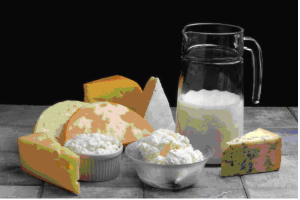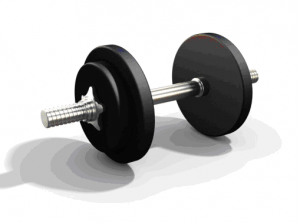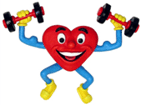Happy August
Wow, can you believe we are now into the second half of the year? Time flies…. and with time, comes renewals, regroupings, recommitments to all those earlier goals that somehow waiver as we get too comfortable with them. Take a moment to rethink, and hope you are on your way to health and happiness as the second half of this year progresses. If you re not half way there, hop, skip and jump, or just break a sweat everyday !!
I dedicate this newsletter to Lactose, since I get many queries on this monosaccharide. Hope I can teach you a fact or two, or at least offer some new, interesting recipe ideas…. Enjoy!!
==========================================================================
The Low-down on Lactose Intolerance
Approximately 4000 million people cannot digest lactose with about 75% of those being African American, Jewish, Native American, and Mexican American. 90% of Asian Americans are believed to also be lactose intolerant. Below is the RDA (Recommended Dietary Allowance) for calcium.
| Table : Recommended Dietary Allowances (RDAs) for Calcium [1] | ||||
| Age | Male | Female | Pregnant | Lactating |
| 0–6 months* |
200 mg |
200 mg |
||
| 7–12 months* |
260 mg |
260 mg |
||
| 1–3 years |
700 mg |
700 mg |
||
| 4–8 years |
1,000 mg |
1,000 mg |
||
| 9–13 years |
1,300 mg |
1,300 mg |
||
| 14–18 years |
1,300 mg |
1,300 mg |
1,300 mg |
1,300 mg |
| 19–50 years |
1,000 mg |
1,000 mg |
1,000 mg |
1,000 mg |
| 51–70 years |
1,000 mg |
1,200 mg |
||
| 71+ years |
1,200 mg |
1,200 mg |
||
* Adequate Intake (AI)
Lactose is found in a variety of foods; however, not all foods containing lactose bother every individual. Many individuals with lactose intolerance can tolerate up to 1 glass (8 oz) of milk, yogurt, and hard cheeses without symptoms. Lactase supplements and lactose-free milk products are easily available and allow for individuals with lactose intolerance to consume an adequate amount of calcium. Drinking milk with meals can also help to alleviate symptoms. Certain conditions may increase the risk of developing lactose intolerance such as Celiac and Irritable Bowel Syndrome. Lactose free milk and regular milk are almost identical- the only difference is the lactose has been broken down in the lactose-free milk.
| Lactose in Common Foods | ||
| Milk, reduced fat | 1 cup | 11 – 14 g |
| Buttermilk, whole | 1 cup | 10 g |
| Yogurt, whole milk | 1 cup | 10 – 12 g |
| Ice cream | ½ cup | 5 – 6 g |
| Yogurt, plain, low fat | 1 cup | 5 – 19 g |
| Sour cream | ½ cup | 4 g |
| Cottage cheese | ½ cup | 3 – 4 g |
| Swiss cheese | 1 oz | 1 g |
| Cream cheese | 1 oz | 1 g |
Common symptoms of lactose intolerance include:
- Bloating
- Abdominal pain
- Diarrhea
If you believe you are lactose intolerant, keeping a food diary is a helpful tool. Elimination diets under the instruction of a health professional can also prove useful. Lactose intolerance, if on a restricted diet, can put some individuals at risk of calcium deficiency, osteoporosis, or other health conditions, typically most individuals can meet their daily needs by a few dietary modifications.
Fitness Corner: Weight-Bearing Exercises for Stronger Bones
Lifting weights can help build stronger muscle and bone but other exercises also provide benefits for your bones (and coordination). Tai Chi, Yoga, Walking, Golf, Dancing, Tennis, and of course, Strength Training offer a variety of activities to do throughout the week. Whether you are using the weight of your own body, resistance, or actual weights, your bones and muscles can benefit. Pick 2 weight-bearing exercises you would enjoy and do them on alternate days (consider dancing or aerobic classes M/W/F and strength training on T/Th/Sa).
Calcium, Vitamin D, and Vitamin K all support healthy bones. Eat and drink up!
Recipe of the Month: Fruit Smoothie
How better to cool off during a hot summer day? Serves 1
- 1/2 cup orange juice
- 1/2 cup low-fat vanilla or plain yogurt; consider Greek yogurt for a creamier texture
- 1/2 banana
- 6 strawberries, hulled
- 1/2 peach, peeled
- 1/3 cup blueberries
- 3 Tbs. soy protein powder; consider 2 Tbs of peanut butter for a protein kick but be aware that it includes a side of fat
- 6 ice cubes; consider pouring your favorite fruit juice into the ice cube tray and use that instead
- 1 tsp. honey or 1 packet no-calorie sweetener, optional
- Put all ingredients in blender, and purée until smooth.
Per SERVING:
| Calories | 386 |
| Protein | 33g |
| Total Fat | 3g |
| Saturated Fat | 1g |
| Carbs | 60g |
| Cholesterol | 6mg |
| Sodium | 84mg |
| Fiber | 5g |
| Sugar | 47g |
Calorie Corner: Milk and Milk Substitutes
*per serving (1 cup); data from nutritiondata.self.com
| Milk | Calories | Fat (Grams) | Protein (Grams) | Carbohydrates (Grams) |
Milk, Buttermilk, Fluid, Cultured, Reduced Fat |
137 | 5 | 10 | 13 |
Milk, whole |
146 | 8 | 8 | 13 |
Milk, Lowfat, Fluid, 1% Milkfat, With Added Vitamin A |
102 | 2 | 8 | 13 |
Milk, fluid, nonfat, calcium fortified (fat free or skim) |
86 | 0 | 8 | 12 |
Silk Plain, Soymilk |
100 | 4 | 7 | 8 |
Silk Pure Almond Original Almond Milk |
60 | 3 | 1 | 8 |
Rice Dream, original, enriched |
120 | 2.5 | 1 | 23 |
Its Still Summertime
Make Use of it!!
Longer Hours in Summer allow you to Take advantage of more daytime hours for outdoor activity. Run, walk or take work breaks outdoors. Consider pinch hitting for your friend’s recreational softball team or walking to the grocery store when you only have a few things to pick up. While not directly a nutritional issue, your activity level will greatly affect the outcome of your nutritional success.
Beat the Heat with a Watermelon Treat
Not only is watermelon is a favorite summer food selection and barbeque closer, it is equally beneficial to health.
The antioxidant lycopene is a chemical found in plants that gives certain foods (watermelon, tomatoes, red grapefruit, and guava) their red color. Part of the large class of plant compounds called carotenoids, which help protect and preserve body cells from oxidation and damage, lycopene may reduce one’s risk of various cancers, particularly prostate cancer. Watermelon is also a good source of antioxidants, that work towards preventing heart disease, lowering cholesterol.
CHOOSING THE PERFECT WATERMELON
Choose a firm, symmetrical fruit that is free of bruises, cuts, and dents.
Pick up the melon, it should feel heavy. (A good watermelon is 92% water.)
The underside should have a creamy yellow spot where the melon sat on the ground and ripened in the sun.
RECIPE SELECTION
Watermelon-Strawberry Smoothie
(16 oz serving)
1 cup seeded watermelon, diced
¾ cup lemon sorbet or sherbet
8 frozen whole strawberries
1 tablespoon lemon juice
4 cubes of ice
1 cup water
Place all ingredients in a blender. Blend until smooth.
(cals; 224, carbs: 50g carbs, 4g fiber (net carbs = 46g (mostly natural sugar: fructose), 2g pro, 0 g fat.
Watermelon Parfait
(2 servings)
½ cup low fat granola
1 cup seedless watermelon, cut into small chunks
2 cups of low fat vanilla yogurt
1 sliced banana, sliced
¼ cup of Almond slivers
In 2 tall glasses
Layer ½ of each of the granola, watermelon, yogurt and banana
Repeat Layers with the other half of the ingredients.
Garnish with slivered almonds.
(cals per serve: 230 cals, 4g fat, 9g pro, 35g carbs, 5 g fiber)







